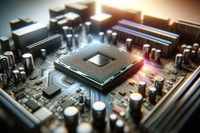AI Investors Are Building Massive Computing Clusters for Startups
Entrepreneur-turned-investors Nat Friedman and Daniel Gross have built a 4,000-chip supercomputer for their startups to use. Other tech investors are also following suit and offering computing support to AI companies.

Building Computing Clusters for Startups
Nat Friedman and Daniel Gross, former executives at Microsoft and Apple respectively, decided to build their own supercomputer after struggling to find enough graphics processing units (GPUs) to meet the demand of AI startups in their portfolio. They now operate the Andromeda Cluster, which consists of over 4,000 GPUs that can be used by their portfolio companies at a discounted rate. Other tech investors, such as Index Ventures and Microsoft's M12, have also started offering computing support for startups.
Andreessen Horowitz is currently in talks with chip providers to set up a compute program on an even larger scale, targeting tens of thousands of GPUs. The firm aims to provide access to computing capabilities to both established companies and newcomers in the AI industry.
The Importance of Computing Power for AI Startups
The demand for GPUs has skyrocketed as they are crucial for training AI models. Startups, however, often face challenges in obtaining the necessary computing power due to limited availability and high upfront costs. Major cloud providers like Microsoft and Amazon are more likely to work with larger customers, making it difficult for smaller startups to access computing resources. The creation of computing clusters, such as the Andromeda Cluster, allows startups to access the necessary computing power at a reduced price.
Access to computing clusters has proven to be beneficial for startups in making progress and accelerating their growth. The availability of computing power enables them to train AI models more quickly, saving months of time in the process.
Challenges and Future Plans
Running a computing cluster requires significant investment and maintenance. Nat Friedman and Daniel Gross have made substantial upfront investments and hired a team of engineers to manage their supercomputer. They charge a small fee to cover operating costs and offer competitive pricing to their portfolio companies. While these efforts have been successful so far, challenges remain as AI companies continue to demand larger clusters.
Despite the challenges, AI investors are committed to providing computing support to startups. The GPU shortage is still a concern, especially for those in need of larger clusters. However, efforts are underway to explore the expansion of existing clusters or the creation of new supercomputers to meet the growing demand.



